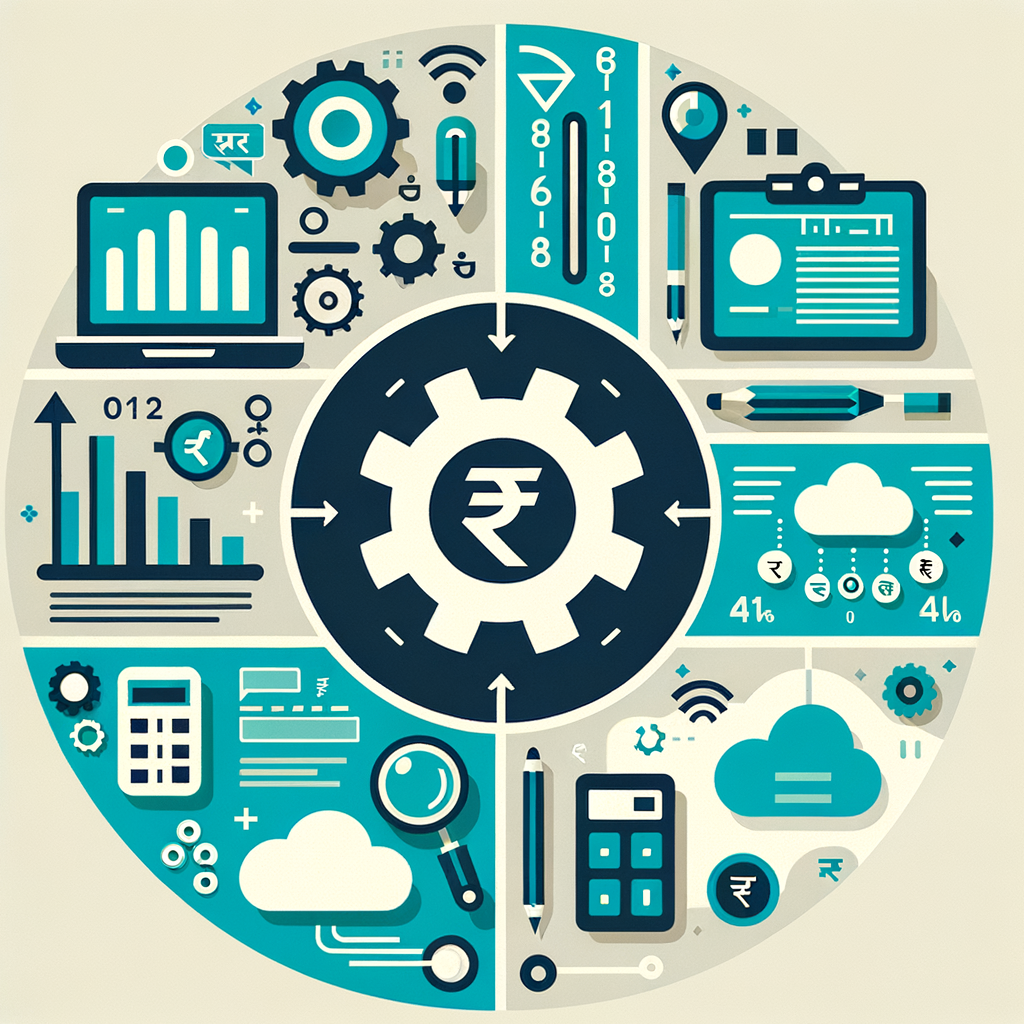Digital Transformation in Accounting: Tools & Trends for Indian Businesses
Are you tired of spending endless hours hunched over spreadsheets, manually entering transaction data, chasing down unpaid invoices, and living with the constant anxiety of making a mistake in your GST or income tax filings? For many Indian small business owners, this is a daily reality. This shift from stressful manual work to streamlined, technology-driven processes is precisely what digital transformation accounting is all about. It involves moving away from traditional bookkeeping methods and embracing modern software, cloud-based platforms, and online tools to manage your finances with greater accuracy and efficiency. This evolution is no longer a luxury—it’s a fundamental necessity for any Indian business or salaried individual wanting to stay competitive, compliant, and in control of their financial health. The landscape is rapidly changing, and understanding the latest accounting technology trends in India is crucial for success. This article will explore the key tools, emerging trends, and the overall impact of digital transformation on accounting in India, providing a clear roadmap for you to get started on your journey to financial clarity.
What is Digital Transformation in Accounting & Why It’s Crucial for India?
At its core, the journey of digital transformation accounting is about leveraging technology to fundamentally change how financial operations are managed. It’s a strategic move away from paper-based, error-prone systems towards an integrated, automated, and intelligent ecosystem. For businesses in India, this transformation is not just about adopting new software; it’s about reimagining financial workflows to meet the demands of a fast-paced, digitally-driven economy. This means gaining the ability to make smarter, data-backed decisions on the fly, ensuring flawless compliance with an ever-evolving tax regime, and freeing up valuable time and resources to focus on what truly matters—growing your business.
From Manual Bahi Khata to Automated Cloud Solutions
For generations, Indian businesses relied on the bahi khata—physical ledger books where every transaction was painstakingly recorded by hand. While this system served its purpose, it was fraught with challenges: the high risk of human calculation errors, the tedious nature of manual data entry, the difficulty in generating timely reports, and the physical vulnerability of the records. Digital transformation represents a monumental leap forward from this traditional model. Modern accounting moves financial data to secure cloud servers, where it is automated, accessible in real-time from any device, and protected by multiple layers of security. This evolution is perfectly suited to address the complexities of the modern Indian economy, especially with the introduction of systems like the Goods and Services Tax (GST) and the increasing prevalence of digital payments, which demand speed, accuracy, and seamless integration.
Key Benefits for Small Business Owners
Embracing digital tools offers a wealth of tangible benefits that can directly impact a small business’s bottom line and operational stability. The advantages go far beyond simple convenience and touch every aspect of financial management.
- Improved Efficiency & Time Savings: Automation is the cornerstone of digital accounting. Repetitive tasks like data entry from bank statements, invoice creation, and payment reconciliation are handled by software, drastically reducing the hours spent on manual administrative work. This frees up entrepreneurs to focus on strategic activities like customer engagement and business development.
- Enhanced Accuracy: Digital systems eliminate the manual calculation errors that can lead to incorrect financial statements and costly tax compliance issues. Software performs calculations with perfect accuracy, ensuring that your profit and loss statements, balance sheets, and tax reports are reliable and trustworthy.
- Real-Time Financial Visibility: With cloud accounting, your financial data is always up-to-date. You can log in from your laptop or phone and instantly see your cash flow, outstanding receivables, and current liabilities. This real-time visibility allows for proactive and informed decision-making, rather than relying on outdated monthly reports.
- Simplified GST & Tax Compliance: The right technology in accounting in India makes navigating the country’s complex tax system significantly easier. Modern software can automatically calculate the correct GST (CGST, SGST, or IGST) on transactions, generate accurate GSTR reports for easy filing, and help manage TDS obligations, minimizing the risk of penalties.
- Better Cash Flow Management: Poor cash flow is a major challenge for small businesses. Digital tools help combat this with features like automated payment reminders for overdue invoices and professional, easy-to-create invoices with integrated payment links. This helps you get paid faster, improving your liquidity and financial stability.
Why Salaried Individuals Should Pay Attention
Digital transformation in finance isn’t just for businesses. Salaried individuals can also benefit immensely from adopting modern financial tools. The same principles of automation, accuracy, and accessibility apply to personal finance management, empowering individuals to take firm control of their economic future. A variety of digital tools for accountants in India and personal finance apps are now available to help manage finances with unprecedented ease.
These tools allow you to:
- Track Income and Expenses: Automatically categorize your spending by linking your bank accounts and credit cards to a budgeting app. This gives you a clear picture of where your money is going each month.
- Simplify ITR Filing: Many apps and software can help organize your financial data—salary, capital gains, deductions under Section 80C—making the annual Income Tax Return (ITR) filing process much simpler and less prone to errors. Our Step-by-Step Guide to Filing Income Tax Returns for Salaried Individuals in India provides detailed instructions.
- Manage Financial Goals: Whether you’re saving for a down payment, planning for retirement, or building an investment portfolio, digital tools help you set goals, track your progress, and stay motivated on your financial journey.
Must-Have Digital Transformation Accounting Tools for 2024
Starting your digital journey requires choosing the right set of tools. The market is filled with options, but a few core categories form the foundation of a modern financial toolkit for any Indian business or individual. These platforms are not just software; they are powerful partners in ensuring compliance and driving efficiency.
Cloud-Based Accounting Software
This is the central nervous system of modern financial management, and Setting Up Cloud Accounting for Your Startup is a critical first step. Cloud-based accounting software hosts your data securely online, allowing you to access and manage your finances from anywhere with an internet connection. Unlike traditional desktop software, it requires no installation, and updates are handled automatically. This trend is a core part of the current accounting software trends in India.
- Top Examples for India:
- Zoho Books: An all-in-one solution that’s excellent for small to medium-sized businesses, offering strong invoicing, inventory, and GST compliance features.
- TallyPrime on Cloud: Perfect for businesses accustomed to the Tally environment but wanting the flexibility and accessibility of the cloud.
- QuickBooks: A globally popular software with a user-friendly interface, ideal for service-based businesses and startups.
- Vyapar: A simple and affordable option targeted at micro and small businesses in India, focusing on billing, inventory, and basic accounting.
- Key Features to Look For: Automated bank reconciliation (which matches your bank transactions with your book entries), comprehensive inventory management, and the ability to generate a wide range of financial reports with just a few clicks.
Automated Invoicing & Expense Management Tools
Managing the flow of money in and out of your business is critical, and specialized tools can streamline this process significantly. These apps are designed to reduce paperwork and accelerate your payment cycles.
- What they do: These tools automate the entire lifecycle of an invoice, from creation and sending to tracking and receiving payment. For expenses, they allow you to simply snap a photo of a receipt with your phone; the app uses technology to read the data (vendor, amount, date) and digitize it, eliminating the need for shoeboxes full of paper receipts.
- Examples: Standalone apps like myBillBook offer robust invoicing and inventory features. Additionally, comprehensive suites like Zoho Books and QuickBooks have powerful, integrated invoicing and expense-tracking modules.
- Benefits: The primary advantages are faster payment cycles through professional invoices and automated reminders, perfectly organized digital expense records for easy tax deductions, and a massive reduction in administrative clutter.
Essential Government Portals: Your Compliance Hub
For any business or individual in India, engaging with government portals is non-negotiable. These are the most critical digital tools for accountants in India and taxpayers, serving as the direct interface for all compliance activities. Familiarity with these platforms is essential.
- GST Portal (
gst.gov.in): This is the official hub for everything related to the Goods and Services Tax. Its primary functions include new GST registration, filing monthly or quarterly returns (like GSTR-1 and GSTR-3B), making GST payments, and claiming input tax credit.- Actionable Tip: Regularly log in to the GST Portal and ensure your registered mobile number and email address are up-to-date. All official communications and OTPs are sent to these contacts.
- Income Tax e-Filing Portal (
incometax.gov.in): This is the central portal for all matters related to income tax. It’s used for filing your annual Income Tax Return (ITR), checking the status of your tax refund, viewing crucial documents like Form 26AS (your tax credit statement) and the Annual Information Statement (AIS), and responding to any notices from the tax department.- Actionable Tip: Before filing your ITR, always download and review your Form 26AS and AIS from the Income Tax e-Filing Portal to ensure all your income and TDS details have been correctly reported by third parties.
The Future is Here: Accounting Technology Trends in India
The digital transformation of accounting is not a one-time event; it’s a continuous evolution. The next wave of technology is set to make financial management even more intelligent, predictive, and secure. Understanding these emerging trends will help businesses prepare for the future and find innovative accounting solutions in India.
Artificial Intelligence (AI) and Machine Learning (ML)
Artificial Intelligence and Machine Learning are no longer concepts from science fiction; they are actively reshaping the accounting profession. In simple terms, AI is about teaching computers to perform human-like tasks, while ML is a subset of AI where the system “learns” and improves from data without being explicitly programmed.
Practical Impact: This technology is driving the digital transformation in finance India by automating high-volume, rule-based tasks, demonstrating How AI is Revolutionizing Tax Filing and Compliance. For example, AI can scan a PDF invoice, automatically extract key information like the vendor name, date, and amount, and enter it into the accounting system, all without human intervention. ML algorithms can analyze thousands of transactions to categorize expenses, flag unusual activity that could indicate fraud, and even forecast future cash flow based on historical patterns. This reduces manual work, minimizes errors, and provides a layer of intelligent oversight.
Big Data & Financial Analytics
Businesses today generate a massive amount of financial data. Big Data refers to the process of collecting and analyzing these vast datasets to uncover hidden patterns, correlations, and other insights. Financial analytics turns this raw data into actionable business intelligence.
Benefits for Business Owners: Traditional accounting tells you what happened—for example, you made a profit of ₹50,000 last month. Financial analytics tells you why it happened. It can reveal your most profitable products or services, identify your peak sales seasons, analyze customer spending habits, and pinpoint areas of inefficiency. This deeper understanding allows business owners to move from reactive reporting to proactive, data-driven strategy.
Blockchain Technology in Accounting
Blockchain is a decentralized, distributed, and immutable digital ledger. Each transaction, or “block,” is cryptographically linked to the previous one, creating a “chain.” Once a transaction is recorded, it cannot be altered or deleted, making it incredibly secure and transparent.
Future Potential: While not yet a mainstream tool for most small businesses in India, the potential of Blockchain in accounting is immense. Its core strength lies in creating a single, tamper-proof source of truth for financial records. This could revolutionize auditing by providing auditors with direct, verifiable access to an immutable transaction history, significantly reducing the time and cost of audits. It can also enhance the security and transparency of supply chain transactions and cross-border payments.
Embracing Digital Transformation in Accounting: Your Next Steps
The message is clear: the shift to digital transformation accounting is not just a trend but an essential business strategy for achieving greater efficiency, ensuring robust compliance, and unlocking sustainable growth. From the foundational power of cloud accounting software and the compliance necessity of government portals to the exciting future promised by AI and analytics, technology is reshaping the financial landscape. By automating manual tasks, gaining real-time insights, and simplifying complex tax obligations, you can free yourself to focus on what you do best—running and growing your business.
The thought of overhauling your entire financial system can be daunting. The key is to start small. You don’t need to implement everything at once. A great first step is to choose one process to digitize. For example, commit to using a cloud-based invoicing tool for one month. See how it streamlines your billing and accelerates payments. Or, start by using an expense management app to track all your business receipts digitally. Once you experience the direct benefits in one area, you’ll be more confident and motivated to expand your digital toolkit.
Navigating the world of digital transformation accounting tools in India can be complex. If you need help choosing the right software, streamlining your GST filing, or understanding these new technologies, TaxRobo is here to help. Our experts provide personalized guidance to make your transition smooth and successful. Contact us today for a free consultation!
Frequently Asked Questions (FAQs)
Q1. Is digital accounting software expensive for a small Indian business?
A: Not necessarily. The market has a wide range of options to fit every budget. Many excellent providers like Zoho Books and Vyapar offer affordable, scalable subscription plans that start from just a few hundred rupees per month. When you consider the immense time saved on manual work and the potential cost of compliance errors, the return on investment from this software is often realized very quickly.
Q2. How does technology in accounting in India specifically help with GST compliance?
A: Modern accounting software is a game-changer for GST compliance. It automates the complex calculation of CGST, SGST, and IGST for all your sales and purchases. It can generate error-free GSTR-1 and GSTR-3B reports in the required format, ready for upload to the GST portal. Crucially, it helps in the reconciliation process by allowing you to easily compare your purchase records with the GSTR-2A/2B data available on the portal, ensuring you claim the correct Input Tax Credit and significantly reducing your compliance risk.
Q3. I am a salaried person. What is the single most important digital tool for me?
A: For a salaried individual, the Income Tax e-Filing Portal is absolutely crucial. It’s more than just a place to file your return. You should make it a habit to log in and review your Annual Information Statement (AIS) and Form 26AS. These documents summarize the income paid to you and the tax deducted on your behalf throughout the year. Verifying these details ensures that all your financial information is correctly reported before you file your ITR, preventing discrepancies and potential tax notices.
Q4. What is the biggest challenge when undertaking a digital transformation in finance for a business?
A: The single biggest challenge is often human-centric: resistance to change and overcoming the initial learning curve. Employees and even owners who are accustomed to traditional methods may feel uncomfortable with new technology. The key to overcoming this is twofold. First, choose software that is known for being user-friendly and intuitive. Second, invest a small amount of time in proper training for yourself and your team. Starting the transition with one simple process at a time, like moving from manual invoices to digital ones, can make the change feel much more manageable and less overwhelming.



